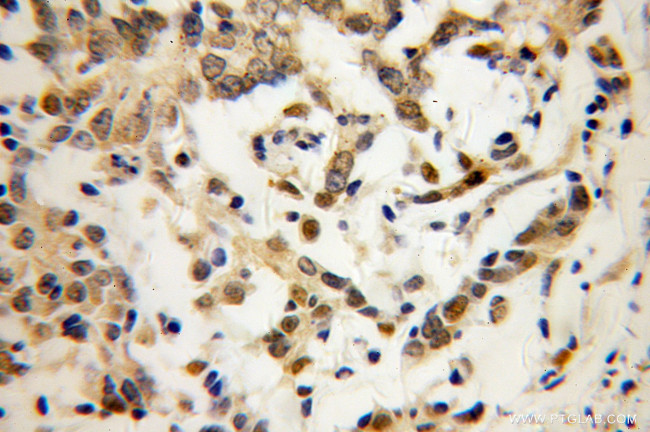Search
Proteintech
AKR1C3 Polyclonal Antibody
{{$productOrderCtrl.translations['antibody.pdp.commerceCard.promotion.promotions']}}
{{$productOrderCtrl.translations['antibody.pdp.commerceCard.promotion.viewpromo']}}
{{$productOrderCtrl.translations['antibody.pdp.commerceCard.promotion.promocode']}}: {{promo.promoCode}} {{promo.promoTitle}} {{promo.promoDescription}}. {{$productOrderCtrl.translations['antibody.pdp.commerceCard.promotion.learnmore']}}
Product Details
11194-1-AP
Species Reactivity
Published species
Host/Isotype
Class
Type
Immunogen
Conjugate
Form
Concentration
Purification
Storage buffer
Contains
Storage conditions
Shipping conditions
Product Specific Information
Immunogen sequence: MDSKHQCVK LNDGHFMPVL GFGTYAPPEV PRSKALEVTK LAIEAGFRHI DSAHLYNNEE QVGLAIRSKI ADGSVKREDI FYTSKLWSTF HRPELVRPAL ENSLKKAQLD YVDLYLIHSP MSLKPGEELS PTDENGKVIF DIVDLCTTWE AMEKCKDAGL AKSIGVSNFN RRQLEMILNK PGLKYKPVCN QVECHPYFNR SKLLDFCKSK DIVLVAYSAL GSQRDKRWVD PNSPVLLEDP VLCALAKKHK RTPALIALRY QLQRGVVVLA KSYNEQRIRQ NVQVFEFQLT AEDMKAIDGL DRNLHYFNSD SFASHPNYPY SDEY (1-323 aa encoded by BC019230)
Target Information
AKR1C3 a member of the aldo/keto reductase superfamily, which consists of more than 40 known enzymes and proteins. These enzymes catalyze the conversion of aldehydes and ketones to their corresponding alcohols by utilizing NADH and/or NADPH as cofactors. The enzymes display overlapping but distinct substrate specificity. This enzyme catalyzes the reduction of prostaglandin (PG) D2, PGH2 and phenanthrenequinone (PQ), and the oxidation of 9-alpha,11-beta-PGF2 to PGD2. It may play an important role in the pathogenesis of allergic diseases such as asthma, and may also have a role in controlling cell growth and/or differentiation. This gene shares high sequence identity with three other gene members and is clustered with those three genes at chromosome 10p15-p14.
For Research Use Only. Not for use in diagnostic procedures. Not for resale without express authorization.
Bioinformatics
Protein Aliases: 17-beta-HSD 5; 17-beta-hydroxysteroid dehydrogenase type 5; 17beta-HSD5; 2-dih; 3-alpha hydroxysteroid dehydrogenase, type II; 3-alpha-HSD type 2; 3-alpha-HSD type II, brain; 3-alpha-hydroxysteroid dehydrogenase type 2; Aldo-keto reductase family 1 member C3; Chlordecone reductase homolog HAKRb; DD-3; Dihydrodiol dehydrogenase 3; Dihydrodiol dehydrogenase type I; dihydrodiol dehydrogenase X; HA1753; indanol dehydrogenase; PGFS; Prostaglandin F synthase; Testosterone 17-beta-dehydrogenase 5; trans-1,2-dihydrobenzene-1,2-diol dehydrogenase; type IIb 3-alpha hydroxysteroid dehydrogenase
Gene Aliases: AKR1C3; DD3; DDH1; DDX; HA1753; HAKRB; HAKRe; hluPGFS; HSD17B5; KIAA0119; PGFS
UniProt ID: (Human) P42330
Entrez Gene ID: (Human) 8644

Performance Guarantee
If an Invitrogen™ antibody doesn't perform as described on our website or datasheet,we'll replace the product at no cost to you, or provide you with a credit for a future purchase.*
Learn more
We're here to help
Get expert recommendations for common problems or connect directly with an on staff expert for technical assistance related to applications, equipment and general product use.
Contact tech support











